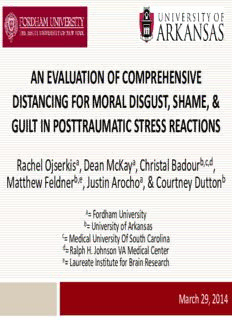
Alleviation of Moral Disgust, Shame, and Guilt in Posttraumatic Reactions PDF
Preview Alleviation of Moral Disgust, Shame, and Guilt in Posttraumatic Reactions
AN EVALUATION OF COMPREHENSIVE DISTANCING FOR MORAL DISGUST, SHAME, & GUILT IN POSTTRAUMATIC STRESS REACTIONS Rachel Ojserkisa, Dean McKaya, Christal Badourb,c,d, Matthew Feldnerb,e, Justin Arochoa, & Courtney Duttonb a= Fordham University b= University of Arkansas c= Medical University Of South Carolina d= Ralph H. Johnson VA Medical Center e= Laureate Institute for Brain Research March 29, 2014 Disclosures Dean McKay receives royalties from: Sage Publications, Elsevier, Johns Hopkins Press, Springer Science+Business, American Psychological Association, and Springer Publications (for book and as Editor of Journal of Cognitive Psychotherapy) Background & rationale Why study moral disgust, shame, & guilt in posttraumatic stress symptoms (PTSS)? Why study comprehensive distancing (CD) as an intervention for these emotions in PTSS? Disgust in PTSS PTSD traditionally described as a disorder of fear 1 Reflected in current standard of care 2-5 However, evidence for other emotions in PTSS (e.g., disgust, shame, guilt) 6-11 Disgust: basic emotion that evokes repulsion and avoidance 12 Evolutionary significance Multiple dimensions Moral disgust in PTSS Moral disgust: disgust experienced towards people that violate boundaries of justice, social acceptability, or fairness 13,14 Relations to trauma (especially interpersonal) Initial evidence for role of moral disgust in PTSS Moral disgust predicts posttraumatic avoidance as mediated by negative affect 15 Shame & guilt in PTSS Shame: negatively valenced, self-referential, moral emotion, pertains to one’s global self-concept Self-directed subtype of disgust? 12,28 Clearly associated with PTSS 11,29,30 Guilt: restricted to specific action or event Associated with PTSS 6,7,31,32 Compared to shame, literature is more equivocal Treating moral, disgust-based emotions Existing treatments may not be maximally effective for moral, disgust-related emotional reactivity in PTSS 16 Disgust has limited response to exposure 17-21 and cognitive modification compared to fear 22,23 Comprehensive distancing (CD) Component of Acceptance and Commitment Therapy (ACT) Neutral observer to mental events – notice but do not react Apt for reducing moral disgust, shame, & guilt in trauma? Shifts internal evaluation of mental events from negative to neutral Case studies 16,24 and RCT underway 25 Aim & hypothesis Aim: Examine CD as intervention for moral disgust, shame, & guilt in PTSS Hypothesis: CD will reduce moral disgust, shame, & guilt following trauma script more than a cognitive challenge comparison exercise Method Phase I (screening) Phase II
Description: